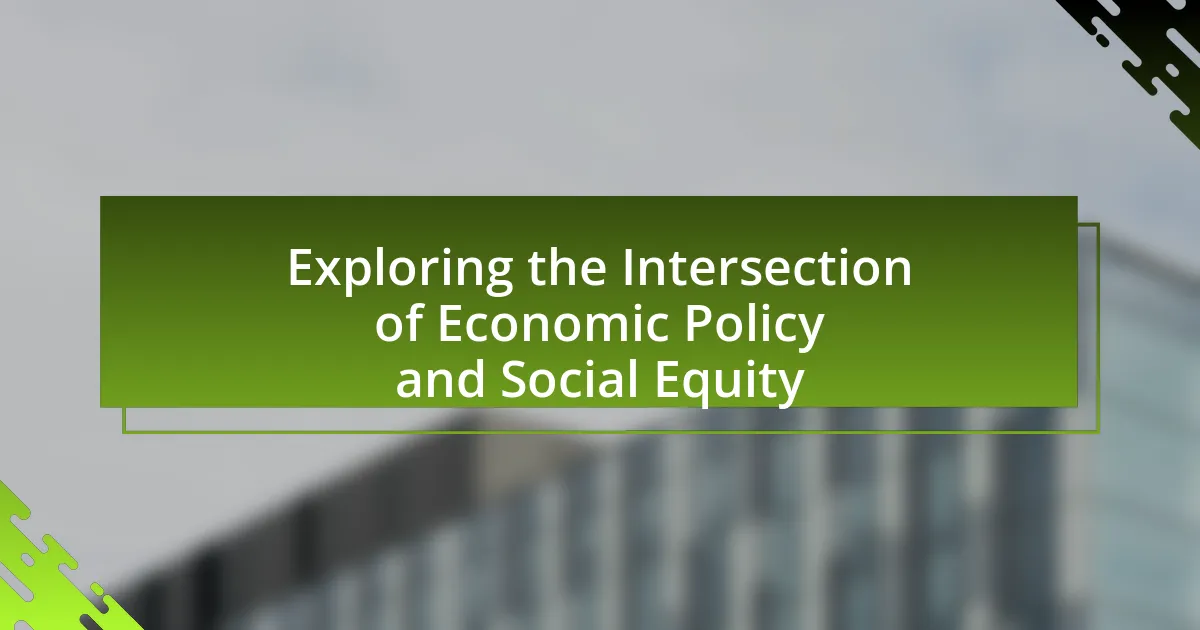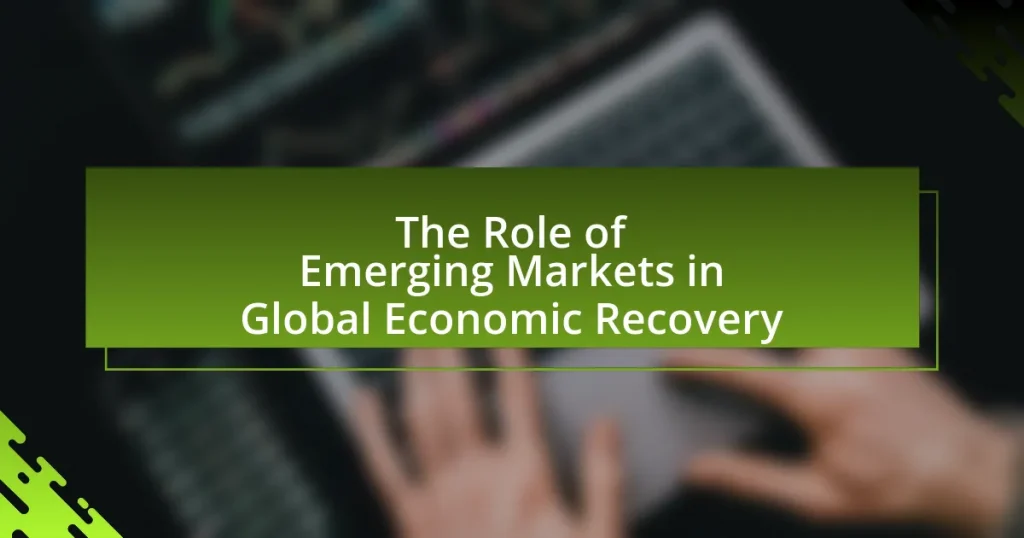The article examines the intersection of economic policy and social equity, highlighting how government decisions regarding taxation, welfare programs, and labor regulations influence wealth distribution and opportunities among various social groups. It discusses key economic policies that impact social equity, such as progressive taxation and minimum wage laws, and their effects on different demographics. The article also addresses the importance of social equity in economic policy, the consequences of neglecting it, and current trends aimed at promoting inclusive growth. Additionally, it explores challenges and barriers to integrating social equity into economic policy, as well as strategies for enhancing equity through community engagement and best practices.
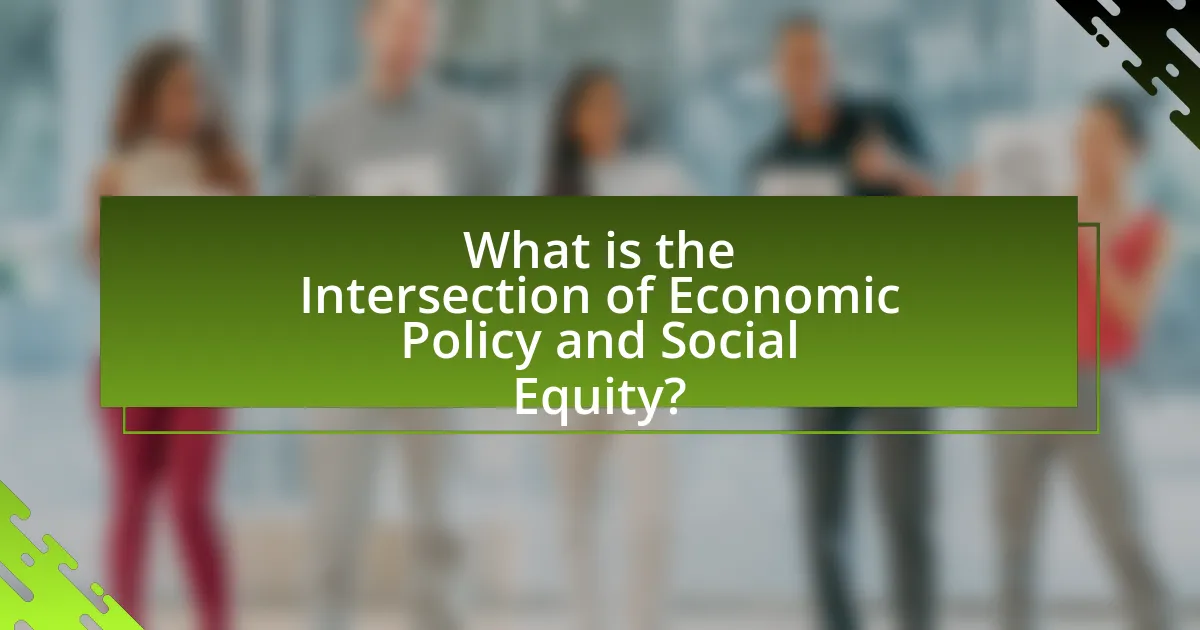
What is the Intersection of Economic Policy and Social Equity?
The intersection of economic policy and social equity refers to the ways in which government decisions regarding economic systems and resource allocation impact the distribution of wealth and opportunities among different social groups. Economic policies, such as taxation, welfare programs, and labor regulations, can either promote or hinder social equity by influencing income distribution and access to essential services. For instance, progressive taxation can reduce income inequality, while inadequate social safety nets can exacerbate disparities. Research indicates that countries with inclusive economic policies tend to have lower levels of poverty and greater social mobility, demonstrating the critical link between economic policy and social equity.
How do economic policies influence social equity?
Economic policies significantly influence social equity by determining the distribution of resources and opportunities within a society. For instance, progressive taxation systems can reduce income inequality by imposing higher tax rates on wealthier individuals, thereby redistributing wealth to fund social programs that benefit lower-income populations. Research from the Organisation for Economic Co-operation and Development (OECD) indicates that countries with more equitable tax systems tend to have lower levels of income inequality, which correlates with improved social mobility and access to education and healthcare. Thus, the design and implementation of economic policies directly shape the landscape of social equity by either bridging or widening the gap between different socioeconomic groups.
What are the key economic policies that impact social equity?
Key economic policies that impact social equity include progressive taxation, minimum wage laws, social welfare programs, and access to education and healthcare. Progressive taxation redistributes wealth by imposing higher tax rates on higher income brackets, which can reduce income inequality. Minimum wage laws ensure that workers receive a living wage, helping to lift low-income individuals out of poverty. Social welfare programs, such as unemployment benefits and food assistance, provide essential support to vulnerable populations, promoting economic stability. Access to education and healthcare is crucial for enabling upward mobility and reducing disparities, as these factors significantly influence individuals’ economic opportunities and overall well-being.
How do these policies affect different social groups?
Economic policies can significantly impact different social groups by either alleviating or exacerbating inequalities. For instance, tax reforms that favor higher-income individuals can widen the wealth gap, while social welfare programs aimed at low-income families can provide essential support and improve their economic stability. Research indicates that policies such as minimum wage increases can benefit low-wage workers, predominantly affecting marginalized communities, thereby reducing poverty levels. Conversely, austerity measures often disproportionately affect vulnerable populations, leading to reduced access to essential services like healthcare and education. These dynamics illustrate how economic policies can either promote social equity or reinforce existing disparities among various social groups.
Why is social equity important in economic policy?
Social equity is important in economic policy because it ensures fair distribution of resources and opportunities, which promotes social stability and economic growth. When economic policies prioritize social equity, they address systemic inequalities that can hinder overall economic performance. For instance, research by the International Monetary Fund indicates that reducing income inequality can lead to higher and more sustainable economic growth. Additionally, equitable access to education and healthcare enhances workforce productivity, contributing to a more robust economy. Therefore, integrating social equity into economic policy not only fosters a just society but also drives economic advancement.
What are the consequences of neglecting social equity in economic policy?
Neglecting social equity in economic policy leads to increased inequality and social unrest. When economic policies favor certain groups over others, disparities in wealth and opportunity widen, resulting in marginalized communities facing systemic disadvantages. For instance, the Economic Policy Institute reported that income inequality in the United States has reached levels not seen since the Great Depression, with the top 1% capturing a disproportionate share of income growth. This neglect can also result in reduced economic mobility, as individuals from disadvantaged backgrounds struggle to access quality education and employment opportunities. Furthermore, a lack of social equity can lead to heightened tensions and conflicts within society, as seen in various protests and movements advocating for social justice.
How can social equity enhance economic growth?
Social equity can enhance economic growth by ensuring that all individuals have equal access to opportunities, resources, and benefits, which leads to a more productive workforce. When marginalized groups are included in the economy, their participation can increase overall economic output; for instance, research from the McKinsey Global Institute indicates that closing gender gaps in labor force participation could add $28 trillion to global GDP by 2025. Furthermore, equitable access to education and training improves skill levels across the population, fostering innovation and competitiveness. This inclusive approach not only drives economic growth but also reduces poverty and inequality, creating a more stable and sustainable economic environment.
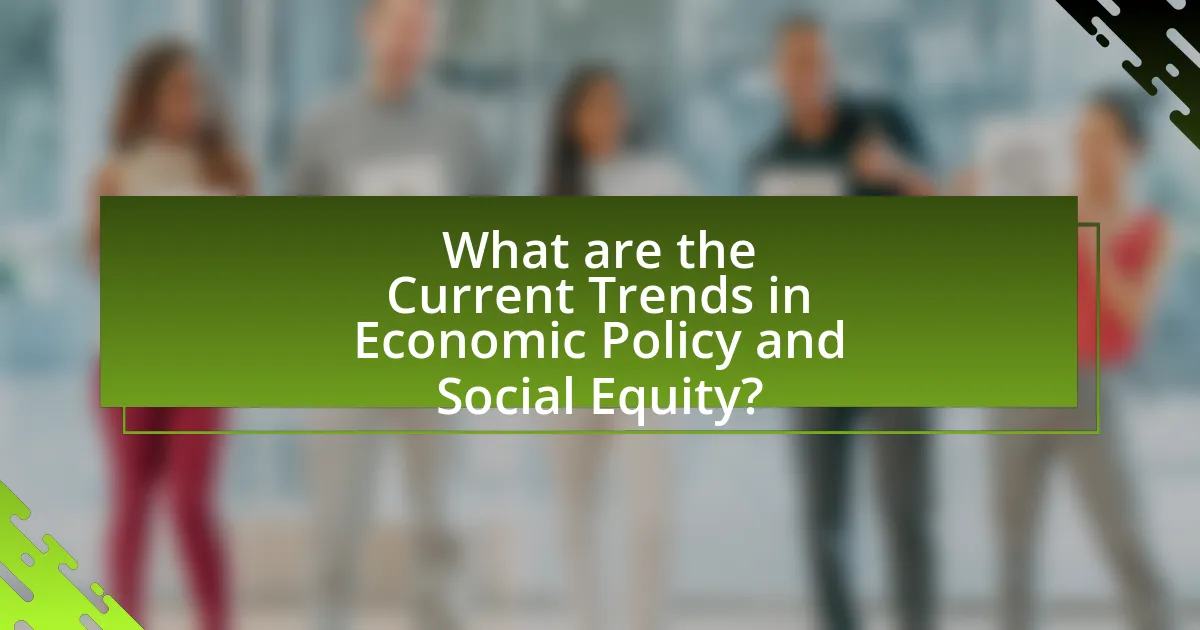
What are the Current Trends in Economic Policy and Social Equity?
Current trends in economic policy and social equity focus on inclusive growth, wealth redistribution, and addressing systemic inequalities. Policymakers are increasingly implementing progressive taxation, universal basic income, and targeted social programs to reduce disparities. For instance, the OECD reported in 2021 that countries adopting wealth taxes have seen a more equitable distribution of resources, which supports social equity initiatives. Additionally, the rise of stakeholder capitalism emphasizes corporate responsibility in addressing social issues, aligning business practices with broader societal goals. These trends reflect a growing recognition that economic policies must prioritize equity to foster sustainable development and social cohesion.
How are governments addressing social equity in their economic policies?
Governments are addressing social equity in their economic policies by implementing targeted fiscal measures, such as progressive taxation and social welfare programs. For instance, many countries have adopted progressive tax systems where higher income brackets are taxed at increased rates, redistributing wealth to fund public services that benefit lower-income populations. Additionally, social welfare initiatives, such as universal basic income or food assistance programs, aim to alleviate poverty and provide essential support to marginalized communities. Evidence of these efforts can be seen in the United States, where the American Rescue Plan Act of 2021 allocated significant resources to support low-income families, demonstrating a commitment to enhancing social equity through economic policy.
What recent policies have been implemented to promote social equity?
Recent policies implemented to promote social equity include the American Rescue Plan Act of 2021, which allocated $1.9 trillion to support low-income families and communities disproportionately affected by the COVID-19 pandemic. This act provided direct payments to individuals, extended unemployment benefits, and increased funding for food assistance programs, thereby addressing economic disparities. Additionally, various states have enacted legislation aimed at criminal justice reform, such as the elimination of cash bail in certain jurisdictions, which seeks to reduce inequities in the legal system. These policies are designed to create a more equitable society by addressing systemic barriers faced by marginalized groups.
How effective have these policies been in achieving social equity?
These policies have been moderately effective in achieving social equity. For instance, targeted initiatives such as affirmative action and minimum wage increases have contributed to narrowing income disparities and improving access to education and employment for marginalized groups. According to a 2021 report by the Economic Policy Institute, raising the federal minimum wage to $15 could lift 1.3 million workers out of poverty, demonstrating a direct impact on economic equity. However, challenges remain, as systemic barriers and unequal access to resources continue to hinder full equity.
What role do international organizations play in promoting social equity?
International organizations play a crucial role in promoting social equity by establishing frameworks and policies that address inequalities across nations. These organizations, such as the United Nations and the World Bank, implement programs aimed at reducing poverty, enhancing education, and improving healthcare access, which are essential for fostering equitable societies. For instance, the United Nations Development Programme (UNDP) focuses on sustainable development goals that directly target social equity, such as gender equality and reduced inequalities, demonstrating their commitment to these issues. Additionally, international organizations often provide funding and technical assistance to countries, enabling them to develop policies that promote social justice and equitable resource distribution.
How do global economic policies impact local social equity?
Global economic policies significantly impact local social equity by influencing income distribution, access to resources, and opportunities for marginalized communities. For instance, trade agreements can lead to job creation in certain sectors while simultaneously displacing workers in others, exacerbating income inequality. According to a study by the International Labour Organization, countries that engage in global trade often see a widening gap between high-skilled and low-skilled workers, which can undermine social equity. Additionally, austerity measures imposed by international financial institutions can reduce public spending on essential services, disproportionately affecting low-income populations and further entrenching social disparities.
What initiatives have been successful in bridging economic and social gaps?
Successful initiatives in bridging economic and social gaps include targeted education programs, microfinance schemes, and universal basic income (UBI) trials. Targeted education programs, such as the Harlem Children’s Zone in New York, have demonstrated significant improvements in academic achievement and social mobility for low-income families. Microfinance schemes, exemplified by Grameen Bank in Bangladesh, have empowered millions of individuals, particularly women, by providing small loans that enable entrepreneurship and economic independence. Additionally, UBI trials, like those conducted in Finland, have shown positive effects on well-being and employment rates, indicating that financial security can enhance social equity. These initiatives collectively illustrate effective strategies for addressing disparities in economic and social outcomes.
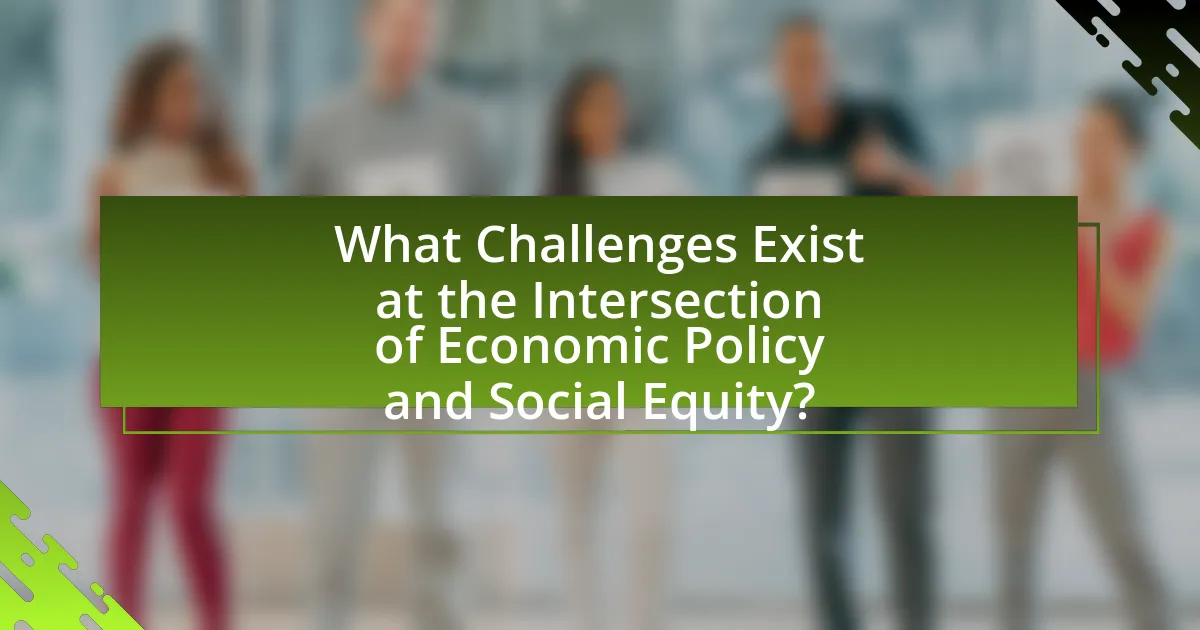
What Challenges Exist at the Intersection of Economic Policy and Social Equity?
Challenges at the intersection of economic policy and social equity include income inequality, access to education, and healthcare disparities. Income inequality is exacerbated by policies that favor wealth accumulation for the affluent, leading to a widening gap between rich and poor; for instance, the top 10% of earners in the U.S. hold over 70% of the nation’s wealth. Access to education is often limited by economic barriers, with lower-income families unable to afford quality schooling, which perpetuates cycles of poverty. Healthcare disparities arise from economic policies that do not prioritize universal access, resulting in significant differences in health outcomes based on socioeconomic status. These challenges highlight the need for economic policies that actively promote social equity to ensure fair opportunities for all individuals.
What barriers hinder the integration of social equity in economic policy?
Barriers that hinder the integration of social equity in economic policy include systemic inequality, lack of political will, and insufficient data on marginalized communities. Systemic inequality manifests in entrenched social structures that prioritize certain groups over others, making it difficult to implement equitable policies. The lack of political will often results from competing interests and the prioritization of short-term economic gains over long-term social benefits. Additionally, insufficient data on marginalized communities limits policymakers’ ability to understand their needs and design effective interventions, as evidenced by studies indicating that data gaps can lead to misallocation of resources and ineffective policy outcomes.
How do political ideologies affect the prioritization of social equity?
Political ideologies significantly influence the prioritization of social equity by shaping policies and frameworks that either promote or hinder equitable resource distribution. For instance, left-leaning ideologies, such as socialism, prioritize social equity through policies that advocate for wealth redistribution, universal healthcare, and education access, aiming to reduce disparities. In contrast, right-leaning ideologies, such as libertarianism, often emphasize individualism and free-market principles, which can lead to reduced government intervention in social welfare, potentially exacerbating inequalities. Empirical evidence shows that countries with social democratic policies, like those in Scandinavia, exhibit lower income inequality and higher social mobility, demonstrating the impact of political ideology on social equity prioritization.
What economic factors contribute to social inequities?
Economic factors that contribute to social inequities include income inequality, unemployment rates, access to education, and wealth distribution. Income inequality, for instance, has been shown to correlate with disparities in health, education, and overall quality of life, as evidenced by the Gini coefficient, which measures income distribution within a population. High unemployment rates disproportionately affect marginalized communities, limiting their economic mobility and access to resources. Furthermore, unequal access to quality education perpetuates a cycle of poverty, as individuals from lower socioeconomic backgrounds often attend underfunded schools, resulting in lower educational attainment and fewer job opportunities. Lastly, wealth distribution, characterized by the concentration of assets among a small percentage of the population, exacerbates social inequities by limiting access to capital for investment and entrepreneurship among disadvantaged groups.
How can these challenges be addressed?
To address the challenges at the intersection of economic policy and social equity, policymakers must implement inclusive economic strategies that prioritize equitable resource distribution. This can be achieved through targeted investments in education, healthcare, and job training programs that specifically benefit marginalized communities. For instance, research by the Economic Policy Institute indicates that equitable access to quality education can significantly reduce income inequality over time. Additionally, policies such as progressive taxation and social safety nets can help redistribute wealth and provide support to disadvantaged groups, thereby fostering a more equitable economic environment.
What strategies can policymakers adopt to enhance social equity?
Policymakers can enhance social equity by implementing targeted economic policies that address systemic inequalities. These strategies include progressive taxation, which redistributes wealth to fund social programs; increasing access to quality education and healthcare, ensuring marginalized communities receive necessary resources; and promoting affordable housing initiatives to reduce homelessness and housing instability. Evidence shows that countries with progressive tax systems, such as Sweden, have lower income inequality and better social outcomes. Additionally, investments in education have been linked to higher economic mobility, as seen in studies by the National Bureau of Economic Research, which highlight the long-term benefits of equitable access to education.
How can community engagement improve economic policy outcomes related to social equity?
Community engagement can improve economic policy outcomes related to social equity by ensuring that policies reflect the needs and perspectives of marginalized groups. Engaging communities in the policy-making process allows for the identification of specific barriers they face, leading to more targeted and effective solutions. For instance, research by the Urban Institute indicates that inclusive policy-making processes can result in policies that better address income inequality and access to resources, ultimately fostering greater social equity. By incorporating diverse voices, economic policies can be designed to promote equitable access to opportunities, thereby enhancing overall economic outcomes for disadvantaged populations.
What are best practices for promoting social equity through economic policy?
Best practices for promoting social equity through economic policy include implementing progressive taxation, increasing access to quality education, and ensuring affordable healthcare. Progressive taxation redistributes wealth by taxing higher incomes at higher rates, which can reduce income inequality. For instance, countries like Sweden and Denmark have successfully utilized this approach to fund social programs that benefit lower-income populations. Increasing access to quality education, particularly for marginalized communities, equips individuals with skills necessary for higher-paying jobs, thereby promoting economic mobility. Research from the National Bureau of Economic Research indicates that investments in education yield significant long-term economic benefits. Lastly, ensuring affordable healthcare reduces financial burdens on low-income families, allowing them to invest in education and employment opportunities, as evidenced by studies showing improved economic outcomes in regions with accessible healthcare services.
